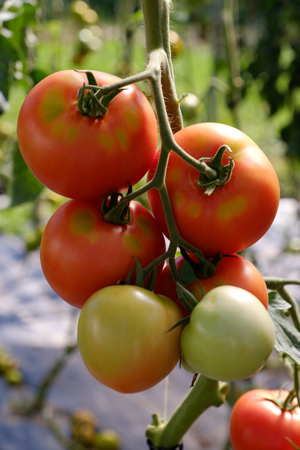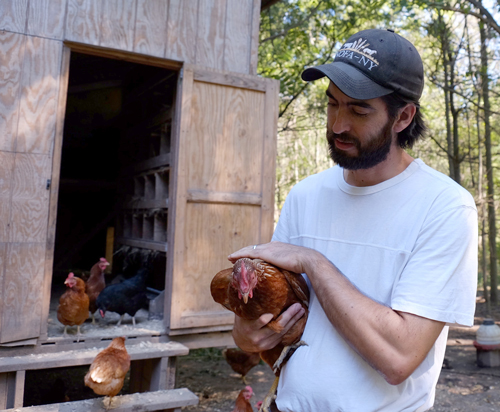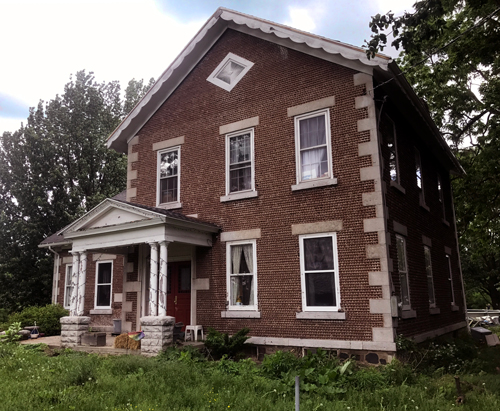![]()
On the farm with Denis Lepel of Lakestone Family Farm
Story and photos by Donna De Palma unless noted

Tomatoes
Denis Lepel never suspected that tending a garden would lead to a life of farming. Lepel, and his wife, Trish, picked up roots in Rochester and moved to Queens when Trish’s father fell ill with Parkinson’s. Lepel’s father-in-law bestowed the care and feeding of his tomato garden on Denis.
While in Queens, Denis and Trish joined a CSA on Long Island. “Even though I’d worked as a produce manager at a local grocery store for eight years, I was introduced to vegetables I’d never seen before like Hakurei turnips and many different varieties of eggplant” says Lepel.
The couple’s excitement about organic and local foods expanded. Lepel’s awareness about our food system was awakened by the video series, “Meatrix.” The films opened Lepel’s eyes.
“We watched these films which were cartoon parodies of the Matrix movies. They talk about factory farming and the meat system and how the meat we eat is raised.”

Denis Lepel with hens.
Shortly after viewing the “Meatrix” series, Lepel decided it was time to start eating healthier food. He and Trish decided to visit the CSA farm they’d joined. “That was when it hit me. Farming might be something I’d be interested in doing.”
Lepel expanded the garden plot in his father-in-law’s yard. He gardened in raised beds behind the house in Queens. “I had an affinity for gardening. My garden got larger and larger. I employed home garden methods such as square foot gardening to increase yields on small plots. It worked well. We had 30 different varieties of vegetables growing in a 48 sq. ft. garden.”
“When my father-in-law passed away, it was a pivotal moment for us. We had already started our family and wanted to raise our children near our parents. My parents were all we had left and they were in Rochester. We asked ourselves, ‘What can we do for work if we move back.’ We toyed with the idea of buying land and starting a farm. Worst case scenario and the farm folds, I could get a traditional job.”
“My wife and I started thinking maybe we could do this. We trolled the internet for anything within a 30-mile radius of Rochester. We thought Rochester would be a good market. A lot of people live in the area. Organic produce is gaining in popularity. Our farm would be close enough for people to visit as members of a CSA.”
“We found some property online in October, 2010. We were visiting Rochester for Thanksgiving that year and said to ourselves, ‘If it’s still there when we visit, we’ll take a look.’ The property sounded much better than it actually turned out to be.”

Lakestone Family Farmhouse courtesy Denis Lepel.
The Lepels fell in love with the 1850’s farmhouse for sale in Farmington but they didn’t know anything about the land it was on. “When you’re farming, the land is the most important thing. But I had never farmed a day in my life, so I didn’t know how important soil was. I thought, at the time, a farm is a farm.”
Lepel booked a reservation to attend the winter conference of NOFA NY in Saratoga Springs in January of 2010. And he started reading about farming—anything he could get his hands on.
Lepel went to his first NOFA conference armed with computer printouts and aerial maps of the farm. “Half of the people I met at the conference thought buying this land was a mistake. They said the soil was too rocky.”
“But I felt such a connection with the people at the NOFA conference. The community was so inviting. They told me I wouldn’t make money but no one told me I was crazy to want to farm. So that clinched it in my mind; that this could be something I could do.”
Lepel needed the exposure to other organic farmers. “I met a whole lot of people that I’m still in contact with to this day. People I see on a weekly basis at farmers’ markets. It’s such a tight community.”
“People at the conference told me I needed to learn more about farming. It was there I heard about Stone Barns Center for Food & Agriculture in Westchester County. I applied for an apprenticeship. Instead, I was awarded an internship because I didn’t have any farming experience. I use many of the techniques and principles I learned at Stone Barns Center on my farm today.”
Lepel interned at the Center from June through October of 2010. “Because I couldn’t wait to begin farming, immediately upon returning to Queens from the first NOFA conference, I picked up an organic food guide. I called every farm within an hour of my house in Queens to volunteer.”
Restoration Farm in Old Bethpage on Long Island took Lepel in as a volunteer in February of that year. His first project, besides shoveling snow, was converting a tractor from fossil fuel to electric power.
The Lepels closed on the farmhouse in Farmington in the summer of 2011 and haven’t looked back since starting Lakestone Family Farm in the spring of 2012.
The training Lepel received at Restoration Farm served him well. “We started seeding, planting and clearing land. My system of farming is a combination from those two farms because that’s all I ever saw before I started here. The things we did—the raised bed system—came from the model at Stone Barns and many of my planting techniques are similar to those at Restoration Farm.”
Lakestone Family Farm has grown in the seven years since the first seeds were planted. Lepel worked alone for most of the first season, breaking ground, plowing and building raised beds.
“I planted three-quarters of an acre myself that first year. By the second year it was a full acre. By then, I’d hired help,” says Lepel.
Lepel is still perfecting his craft. His 64-acre farm has room to grow. “I had never started a plant from seed before the farm. I built a greenhouse without knowing how to use one. The best tomato transplants came that first year before I knew what I was doing.”
He’s learned to work with the heavy, silty loom and clay subsoil on his farm. According to Lepel, soils are very local and soil types can vary within a single farm.
The Lepels also raise chickens, 500 hens that lay, on average, 28 dozen eggs a day. How did Lepel learn to raise chickens? He read a book. “Our chickens are on fresh pasture daily. Our pastures are our gardens so where we have fallow land that was gardened, that’s where we put our chickens to fertilize the land.”
Lepel plans to expand his poultry processing facility later this summer to increase its processing capacity from 1000 chickens to 20,000.
The Lepels CSA has 50 members, many of whom come to the farm to pick up vegetable, egg and chicken shares. Lakestone Family Farm grows mini-jewel lettuce bouquets, kale, Hakurei turnips, baby bokchoy, spinach, string beans, tomatoes, eggplant, garlic, leeks, onions, summer, fall and winter squash, ten varieties of peppers, cherry tomatoes, Swiss chard, strawberries and more on two acres for their CSA and for local farmers’ markets.
“I raise close to 100 varieties of vegetables here. We started our CSA in 2014. The CSA model was one of our motivations for starting the farm. Because we were members of a CSA and I was volunteering at a CSA farm—Restoration was a CSA— I really had that as my mindset. I wasn’t interested in farmers’ markets then because most of what I had read was written by CSA farmers who downplayed farmers’ markets.” According to Lepel, farmers’ markets now account for a major portion of the farm’s annual income.
Lepel hasn’t quite hit his projections yet. He was hoping to be in the black by now, but says he’s getting closer day by day.
Denis and Trish Lepel plan to grow their farm and their family. Their three children, Abby, Josh, and Ben, haven’t known much other than farm life which is what Denis and Trish always dreamed of for them. Life on the farm is good and the Lepel family, and their farm, are thriving.
Donna De Palma is a freelance writer based in Rochester.
Views: 14




